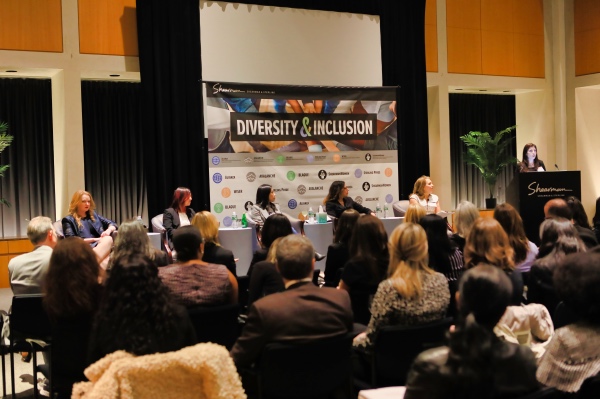Despite continuing advances in gender equality in the workplace and beyond, there’s a reason conversations about the issue continue: female graduates still face some disadvantages in the jobs market.
Recent reports have revealed the extent to which the gender pay gap still exists, and the difference can be seen between male and female graduates’ starting salaries. Data published in 2015 showed that twice as many men earn between £30,000-£40,000 than women, and that the median salary for female graduates was £1,000 less than that of males. And the level of women in senior management positions and on company boards is still proportionally lower across the workforce than that of men.
So there are plenty of reasons to apply to a company that is taking active steps to achieve true gender equality and diversity in the workplace, but which of them also offer good opportunities at graduate level?
We’ve put together this list by cross-referencing the most recent editions of The Times Top 100 Graduate Employers and The Times Top 50 Employers for Women. And as there are 30 employers that make both lists, we narrowed it down by looking at where they placed on the Guardian’s UK 300 – a ranking of which employers graduates most want to work for.
The Big Four (professional services)
It may be a cheat to include 4 employers in one, but all of the UK’s leading professional services firms – Deloitte, KPMG, PwC, and EY – performed well in the rankings, and between them planned to hire around 5,100 graduates in 2016.
The 2015-16 Graduate Employers list saw PwC top the table for the twelfth year in a row. Its graduate scheme is built upon strong foundations of mentoring, training, development, and support. And though it’s biggest base is in London, there are 29 locations across the UK that graduates can join. The firm also runs a high potential female development programme, Breakthrough, and sets gender and ethnicity targets for each grade pool.
Deloitte, KPMG, and EY also all rank within the top ten graduate employers, and have been recognised for their commitment to gender equality in the workplace, and for running a variety of schemes and programmes to help women maximise their potential. EY’s Managing Partner for Talent in the UK and Ireland, Liz Bingham, stressed the importance of an approach that encompasses the entire workforce, improving diversity ‘from graduate entry to the boardroom’.
Deloitte has also chosen to publically engage with the problem of the gender pay gap, reporting its own average wage gaps across the company and at each grade; the firm is determined to balance the numbers and has set new targets for women in senior positions.
MI5 (public service)
A far cry from the popular media image of the gentleman spy – white, male, private school and Oxbridge educated – the Secret Service is actually well recognised for its commitment to diversity.
As well as establishing itself as a top employer for women and taking strides in employing Black, Asian, and Minority Ethnic staff, MI5 was named Employer of the Year 2016 in Stonewall’s list of best employers for LGBT staff. Staff of all gender identities and sexual orientations are recruited and work in every area of the organisation.
The Service recruits around 80 graduates, who can expect to earn between £28,500-£30,000 at entry level, who join graduate programmes for Intelligence Officers and Intelligence Data Analysts.
Unilever (consumer goods)
Unilever UK has 40 brands covering a variety of commodities, from soup to soap. The employer recruits 50 graduates at starting salaries of £30,000 to its Management and Development programme. It also employs another 50 or so students on industrial or summer placements.
The company demonstrates internal commitment to and external promotion of gender equality; at the Business in the Community Workplace Gender Equality Awards it received the Female FTSE 100 Award, which recognises the affiliate organisation with the most women on its board.
JP Morgan (financial services)
Rising to 14th place in the Top Graduate Employers list, JP Morgan is the first global finance firm to achieve such a high ranking. Although it has no set graduate recruitment targets, the bank hires several graduate analysts on competitive salaries each year, and many of these are recruited straight out of its competitive internship programmes. Developing junior talent is considered vital.
Globally, the firm is dedicated to creating a positive culture for people from diverse backgrounds, and in the USA 55% of representatives are female. As well as promoting equality in the workplace, JP Morgan has also contributed to external projects aimed at helping women. For instance, the bank partnered with the Cherie Blair Foundation for Women in 2014 to help female entrepreneurs in the United Arab Emirates, and hosted a discussion panel during Women’s History Month.
Goldman Sachs (financial services)
Goldman Sachs recruits around 400 graduates to join its New Analyst and New Associate Programmes. The programmes aim at helping graduates develop and become integrated members of the team, with access to several mentoring and training opportunities.
Amongst the bank’s policies promoting equality are its efforts to reach out to female undergraduates and sixth-formers in an attempt to encourage more women to go into what is still sometimes stereotyped as a male dominated culture. Efforts are also being made to promote more women into senior roles, both to further their careers and to create a greater number of female role models for entry-level women to look up to.
The bank also launched ‘10,000 Women’ in 2008, an initiative aimed at helping female entrepreneurs worldwide.
IBM UK (IT and telecommunications)
The IT company makes a concerted effort to reach out to girls at every stage of their education, running a Schools’ Outreach Programme, and even holding an annual ‘Take Our Daughters to Work’ day. There are also several initiatives aimed at supporting women in the company; globally, the firm has over 220 networking groups and over 50 of these are for women. In fact, the company’s website includes a section dedicated to the women of IBM.
It planned an intake of over 300 graduates, at salaries of £30,000 or more. Graduate hires also have access to the company’s generous benefits packages, ranging from travel insurance to a discount bicycle scheme.
Shell (oil and gas)
Shell’s recruitment target was between 80-100 graduates, on salaries of £32,500. Graduates can join the Commercial, Technical, or Corporate Function areas, and receive full training to ready them for on-going advancement in the company.
Shell aims to support equality and diversity at each stage of the employee life-cycle. Its recruitment programme looks to hire graduates from diverse backgrounds. The company has introduced a shared parental leave policy that matches their maternity leave policy. It also boasts several employee led diversity and inclusion networks, as well as development and mentoring schemes.
However, given the company layoffs that occurred early in 2016 in the face of weakened oil prices, this may not be the most secure industry to go into at the moment.
Procter and Gamble (consumer goods)
P&G onboards around 100 graduates in the UK at salaries of £30,000. Although the focus is on-the-job training – with graduates given responsibility from the start – the company encourages graduates to take training courses that are developed with external partners.
A driven approach to staff development has led P&G to achieve gender neutrality in the areas of sales, finance, and marketing. Most importantly, the UK leadership team is also balanced, with 8 men and 7 women in the most senior positions.
Microsoft (technology)
Recruiting 36 graduates on salaries of £34,700, roles at the tech giant are highly sought after. Graduates join the Microsoft Academy for College Hires (MACH) scheme, developing skills for a career in marketing, technology, or sales.
As well as seeking to encourage women to pursue careers in technology, and promoting women’s networks through such features as their separate women’s Facebook page, Microsoft has also launched an innovative internal strategy to drive inclusion. All employees are expected to complete a course on Unconscious Bias Training, encouraging both men and women to break down traditional gender barriers.
By expecting everybody to change their behaviours and to create an inclusive culture, Microsoft aims to build a truly equal workplace.
BAE Systems (engineering and industrial)
The 350 or more graduates joining BAE Systems can look forwards to salaries of £25,000 and up, and benefits that can include a £2,000 welcome bonus. Schemes include the Graduate Framework Programme (2 years), the Finance Leader Development Programme (5 years), and the Sigma Leadership Programme (3 years).
BAE Systems has taken a stand against all forms of bullying and inappropriate behaviour in the workplace, signing the ‘No Bystanders’ pledge to take action against all such behaviours. It also uses a Diversity and Inclusion Matrix to track their progress in this matter – from a business that meets regulatory requirements to one that recognises diversity as a boost to their performance levels.
Claire Kilroy is a content writer for the UK’s leading graduate recruitment agency, Inspiring Interns. Check out their website if you’re on the hunt for internships or graduate jobs London.










